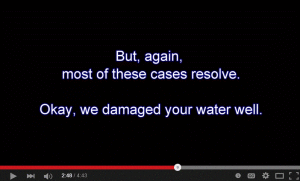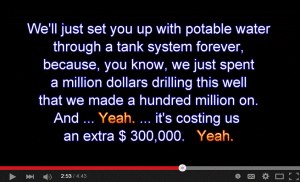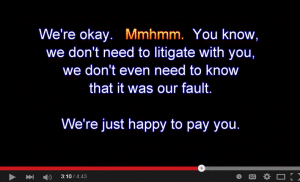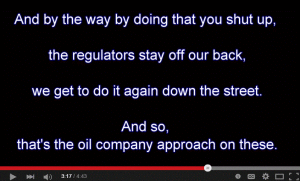
Imagine suing an oil and gas giant and the law-violating regulators enabling crimes by that giant. Then imagine your lawyers (in my case, Murray Klippenstein and Cory Wanless) stabbing you in the back half way through, 11 years and hundreds of thousands of dollars later, abruptly quitting with no warning, and further f*cking you and your public interest case by refusing to send your file, ignoring your correspondence, withholding your trust account funds for a year, and your website for nearly a year. All the while, lying about it and blaming you.
The defendants, politicians (many are corrupt yet they appoint our judges and move them around to interfere with cases to serve the rich and powerful) and judges on my case pulled many stunts delaying my case, piling high smear upon smear, lie upon lie, shuffling judges, and cost upon cost for no reason other than to stress me out, waste my time and savings and make me give up and quit. I didn’t. My lawyers quit instead. Some “access to justice.”
How “just” are Charter rights (Freedom of Expression) violating gag orders and settlements sleazily bullied onto the harmed by companies or ordered by judges to keep the law violations, toxic pollution and health harms secret so that oil companies can do it again “down the street” – as admitted to by AER’s outside counsel, Glenn Solomon?
How “just” is Appropriate Dispute Resolution pushed by the courts and AER, that comes with an automatic instant gag, silencing the harmed and violating our right to Freedom of Expression before we even begin?

Current model of lawyering unequally distributes legal power in society, scholar says by Ian Burns, Oct 29, 2020, The Lawyer’s Daily
Substantive change is required in the legal system — and legal education — to meaningfully address access to justice and systemic racism. That was the message from scholars who spoke on an Oct. 26 panel set up as part of Access to Justice Week.
The “Conversation About Access to Justice and Systemic Racism” was hosted by University of Alberta law dean Barbara Billingsley and involved insights from Trevor Farrow, a professor at Osgoode Hall Law School, and Joshua Sealy-Harrington, a doctoral candidate at Columbia Law School and a lawyer at Power Law. Sealy-Harrington said the Canadian discourse on access to justice has been routinely conceptualized as access to courts but to truly understand it there are two distinct steps are required — looking at what justice is, and then looking at how people actually access it.
“Conceptualizing access to justice simply as access to courts presupposes that our courts in fact provide justice, but I think that we need to jettison that presupposition,” he said. “In my view, our privatized and individualist model of lawyering is systemically unjust as it unequally distributes legal power in our society.”
Sealy-Harrington said “we all know” the more money you have the better lawyer you can get and the more you can leverage the legal system, and one’s social position in society influences perceptions of credibility and therefore the extent to which rights can be legally vindicated.
“The consequence of that is we don’t really have one legal system, but multiple legal systems,” he said. “We have one legal system for white people and another for Black and Indigenous people, and we also have one system for men and another for women and transgender people. And in my view these systems in many ways do not give justice, so it follows that access to those legal systems cannot give justice either — I think to provide justice our legal system requires not just rules, but ensuring that system is not predicated on one’s power in society.”
There are a lot of people who think the best solution for the access to justice crisis is to get lawyers out of the way and let the market in, said Farrow. But he added he isn’t convinced pitching an “increasingly unequal, unjust and often unsafe society into the open arms of the private sector” is the answer to the problem.
“There is a lot of innovation which has happened that will be part of the menu of solutions for our access to justice crisis — I’m thinking of online dispute resolution and legal apps,” he said. “But they are not the silver bullet for all justice issues, and finding ways to deliver good justice to more people as opposed to perfect justice for just a few is a critical project post-COVID. I think we need to embrace technology where it is needed but to remember public justice in terms of behaviour modification, the creation of norms and laws and the protection of vulnerable communities.”
But Sealy-Harrington said recovery from COVID-19 connotes the idea of a return to normal, and he rejected the idea the former normal was even just in the first place.
“I don’t think the pandemic in this case made a just Canada unjust but rather aggravated the conditions of injustice which were already pervasive across Canada,” he said. “As Canadians we are at a fork between incremental and radical change in the legal system, and I would personally like to see more radical change. What that looks like I’m not precisely sure but at a minimum radical change necessitates a systemic lens — we must assess the health of our legal system not simply in terms of the apparent fairness of the rules which govern it, but the tangible and material outcomes of that legal system from the standpoint of societal hierarchies.”
The “fetishisation” of procedure and a disregard for outcomes has routinely created injustice in Canadian society, said Sealy-Harrington. He pointed to the issue of sexual assault defence, where historically the system provides for virtually unbridled cross-examination of sexual assault survivors with little connection to any legitimate defence theory.
“Procedure can be weaponized to foster substantive inequality,” he said. “I think we do need to be having conversations about adversarial systems in some contexts, because I don’t know if they are all that effective. In family law we have seen a big shift towards things like collaborative law because we have realized burning down the house and all the money we had to support our children in a legal battle and then taking the 10 per cent that is left and dividing it 80-20 isn’t a meaningful conception of justice.”

Refer also to:

Legal Advice Dec1 2014 audio of Glenn Solomon, AER’s outside counsel in my case against the regulator, advising another frac harmed Albertan on how gag orders work (and why) in the oil and gas industry. Solomon’s words in white font.

Glenn Solomon




More at link.
